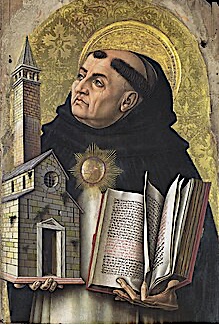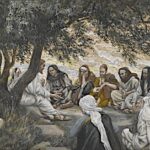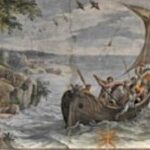Illustration: Image of St Thomas Aquinas
Panel of an altarpiece from Ascoli Piceno, Italy, by Carlo Crivelli (15th century)
Apostolic Letter in the form of a “Motu Proprio” of the Supreme Pontiff, Pope Francis
“Ad theologiam promovendam” (To promote theology)
with which new statutes of the pontifical academy of theology are approved
Given at Rome, at St. Peter’s, on the 1st day of November in the year 2023,
the Solemnity of All Saints, the eleventh of the Pontificate.
The ‘Motu Proprio” is translated from Italian using Microsoft Word
1. In order to promote theology in the future, one cannot limit oneself to abstractly re-proposing formulas and schemes of the past.
Called to interpret the present prophetically and to discern new paths for the future, in the light of Revelation, theology will have to confront profound cultural transformations, aware that: “What we are experiencing is not simply an era of change, but a change of era”
(Address to the Roman Curia, 21 December 2019).
2. The Pontifical Academy of Theology, founded at the beginning of the eighteenth century under the auspices of Clement XI, my Predecessor, and canonically instituted by him with the brief Inscrutabili on 23 April 1718, in the course of its centuries-old existence has constantly embodied the need to place theology at the service of the Church and of the world, modifying its structure when necessary and broadening its aims: from the initial place of theological formation of ecclesiastics in a context in which other institutions were lacking and inadequate for this purpose, to a group of scholars called to investigate and deepen theological themes of particular importance.
The updating of the Statutes, desired by my Predecessors, marked and promoted this process:
one thinks of the Statutes approved by Gregory XVI on 26 August 1838 and those approved by Saint John Paul II with the Apostolic Letter Inter munera Academiarum on 28 January 1999.
3. After almost five decades, the time has come to revise these norms, to make them more suited to the mission that our time imposes on theology.
A synodal, missionary and “outgoing” Church can only correspond to an “outgoing” theology.
As I wrote in my Letter to the Grand Chancellor of the Catholic University of Argentina, addressing professors and students of theology: “Do not be satisfied with a theology on the table. May your place of reflection be borders. […]. Good theologians, like good shepherds, smell of the people and the street and, with their reflection, pour oil and wine on the wounds of men.”
Openness to the world, to man in the concreteness of his existential situation, with his problems, his wounds, his challenges, his potentialities, cannot however be reduced to a “tactical” attitude, extrinsically adapting contents that have now crystallized to new situations, but must urge theology to an epistemological and methodological rethinking, as indicated in the Preamble to the Apostolic Constitution Veritatis Gaudium.
4. Theological reflection is therefore called to a turning point, to a paradigm shift, to a “courageous cultural revolution”(Encyclical Letter Laudato Si’, 114) that commits it, in the first place, to being a fundamentally contextual theology, capable of reading and interpreting the Gospel in the conditions in which men and women live daily, in the different geographical environments, and having as its archetype the Incarnation of the eternal Logos, His entry into the culture, the vision of the world, the religious tradition of a people.
Starting from here, theology can only develop in a culture of dialogue and encounter between different traditions and different knowledge, between different Christian confessions and different religions, openly confronting everyone, believers and non-believers alike.
The need for dialogue is in fact intrinsic to the human being and to the whole of creation, and it is the particular task of theology to discover “the Trinitarian imprint that makes the cosmos in which we live ‘a web of relationships’ in which ‘it is proper to every living being to tend towards something else'” (Apostolic Constitution Veritatis Gaudium, Preface, 4a).
5. This relational dimension connotes and defines, from the epistemic point of view, the status of theology, which is impelled not to close itself in self-referentiality, which leads to isolation and insignificance, but to grasp itself as inserted in a web of relationships, first of all with other disciplines and other forms of knowledge.
It is the approach of trans-disciplinarity, that is, an inter-disciplinarity in the strong sense, distinct from multi-disciplinarity, understood as inter-disciplinarity in the weak sense.
The latter certainly favors a better understanding of the object of study by considering it from several points of view, which however remain complementary and separate.
Trans-disciplinarity, on the other hand, must be thought of “as the collocation and fermentation of all knowledge within the space of Light and Life offered by the Wisdom that flows from God’s Revelation” (Apostolic Constitution Veritatis Gaudium, Preface, 4c).
Hence the arduous task for theology is
to be able to make use of new categories elaborated by other forms of knowledge,
to penetrate and communicate the truths of the faith and
to transmit the teaching of Jesus in today’s languages, with originality and critical awareness.
6. Dialogue with other forms of knowledge obviously presupposes dialogue within the ecclesial community and an awareness of the essential synodal and communal dimension of doing theology:
the theologian can only live fraternity and communion in the first person, at the service of evangelization and in order to reach the heart of all.
As I said to theologians in my Address to the Members of the International Theological Commission on 24 November 2022: “Ecclesial synodality therefore commits theologians to do theology in a synodal form, promoting among themselves the ability to listen, dialogue, discern and integrate the multiplicity and variety of requests and contributions“.
It is therefore important that there be places, including institutional ones, in which to live and experience collegiality and theological fraternity.
7. Finally, the necessary attention to the scientific status of theology must not obscure its sapiential dimension, as Saint Thomas Aquinas has already clearly stated (cf. Summa theologiae I, q. 1, a. 6 – see footnote below).
Therefore Blessed Antonio Rosmini considered theology a sublime expression of “intellectual charity”, while he asked that the critical reason of all knowledge be oriented to the Idea of Wisdom.
Now the Idea of Wisdom inwardly binds Truth and Charity together in a “solid circle”, so that it is impossible to know the truth without practicing charity: “because one is in the other and neither of the two outside the other is found. Hence he who has this Truth has with it the Charity that fulfills it, and he who has this Charity has the Truth fulfilled” (cf. Degli studi dell’Autore, nn. 100-111).
Scientific reason must broaden its boundaries in the direction of wisdom,
so as not to dehumanize and impoverish itself.
In this way, theology can contribute to the current debate on “rethinking thought”,
showing itself to be a true critical knowledge insofar as it is sapiential knowledge,
not abstract and ideological, but spiritual, elaborated on one’s knees, pregnant with adoration and prayer; a knowledge that is transcendent and, at the same time, attentive to the voice of peoples, therefore a “popular” theology, mercifully addressed to the open wounds of humanity and creation and within the folds of human history. to whom he prophesies the hope of an ultimate fulfillment.
8. This is the pastoral “stamp” that theology as a whole, and not only in its particular context, must assume: without opposing theory and practice.
Theological reflection is urged to develop with an inductive method,
which starts from the different contexts and concrete situations in which peoples are inserted, allowing itself to be seriously challenged by reality,
to become a discernment of the “signs of the times” in the proclamation of the salvific event of the God of agape, communicated in Jesus Christ.
Therefore, it is necessary first of all to privilege the knowledge of the common sense of the people
which is in fact a theological place in which so many images of God dwell,
often not corresponding to the Christian face of God, only and always love.
Theology is placed at the service of the evangelization of the Church and the transmission of the faith, so that faith may become culture, that is, the wise ethos of the People of God, a proposal of human and humanizing beauty for all.
9. In the face of this renewed mission of theology, the Pontifical Academy of Theology is called to develop, with constant attention to the scientific nature of theological reflection, a transdisciplinary dialogue with other scientific, philosophical, humanistic and artistic knowledge, with believers and non-believers, with men and women of different Christian confessions and different religions.
This can be done by creating an academic community of shared faith and study,
which weaves a network of relationships with other formative, educational and cultural institutions and
which knows how to penetrate, with originality and a spirit of imagination, into the existential places of the elaboration of knowledge, professions and Christian communities.
10. Thanks to the new Statutes, the Pontifical Academy of Theology will thus be able to pursue more easily the goals that the present time requires.
Welcoming the wishes that have been addressed to me for the approval of these new norms, and supporting them, I desire that this eminent place of study may grow in quality, and for this reason
I approve, by virtue of this Apostolic Letter and in perpetuity, the Statutes of the Pontifical Academy of Theology, legitimately drawn up and revised anew, and confer upon them the force of apostolic approval.
All that I have decreed in this Apostolic Letter motu proprio data, I order to have stable and lasting value, notwithstanding anything to the contrary.
Given at Rome, at St. Peter’s, on the 1st day of November in the year 2023, the Solemnity of All Saints, the eleventh of the Pontificate.
FRANCIS
Footnote: Summa theologiae I, q. 1, a. 6
Article 6: Does sacred doctrine constitute wisdom?
What St. Thomas argues here is that sacred doctrine best fulfills the definition of wisdom, since (a) it is about divine things, (b) it judges in terms of the absolute first causes, and (c) it stands in judgment on the other sciences.
This status is not undermined by the fact that sacred doctrine takes its first principles from the science had by God and the blessed; a problem would arise only if it depended on some human science for its first principles. Again, it is not the task of sacred doctrine to prove the principles of other sciences, but simply to stand in judgment on them. (Question: What status do metaphysical principles such as the principle of non-contradiction have within sacred doctrine?)
Finally, St. Thomas makes the important distinction between being wise by way of inclination (i.e., having the gift of the Holy Spirit called wisdom) and being wise by way of cognition (i.e., being a theological inquirer). It is the latter that sacred doctrine aims at, though how far it can get without the former is an interesting question — not too far, I think, especially in moral theory. In fact, this very distinction invites the question of how the saint and the philosopher are related, and whether it is better, all other things being equal, to be both a saint and a philosopher rather than just to be a saint without being a philosopher.


